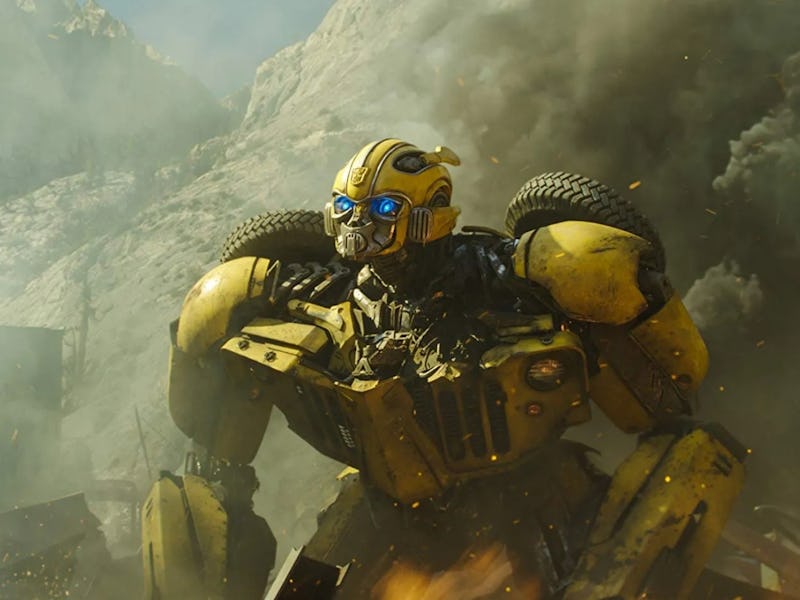The Transformers Franchise Was Almost Saved By a Single Smart Movie
Bigger isn’t always better.

Love it or hate it, Michael Bay’s first Transformers movie was a hugely promising start to one of cinema’s most surprisingly profitable franchises. But after a decade of Bayhem generated over $5 billion at the box office, Paramount Pictures decided to shift gears with the charming, scaled-down Bumblebee in 2018. It still feels fresh today, but it’s also become clear that its much-needed pivot came a little too late.
By the time Bay got to 2017’s Transformers: The Last Knight, things had gotten out of hand. 2014’s Age of Extinction was a remarkable commercial success, but it was a critical low-point, and there was a sense audiences were growing tired of Bay’s “more is more” approach to the series. The budgets had also ballooned beyond control, complicating things for Paramount. When The Last Knight garnered the worst reviews of the series and made $500 million less than its predecessor, it was clear the math no longer added up. The studio needed radical change, and that’s where Bumblebee came in.
Released just a year and a half after The Last Knight, the film focused on an entirely new cast led by Hailee Steinfeld (Pitch Perfect, True Grit) and took the action back to the ‘80s, which is when the robots in disguise were introduced to pop culture. Most importantly, Bay would not be in the director’s chair. Instead, Travis Knight (Kubo and the Two Strings) was brought in to offer a fresh perspective on Hasbro’s toys-turned-cinematic heroes.
Widely regarded as the best in the series, Bumblebee has an E.T. quality to it. Steinfeld’s Charlie finds Bumblebee in a graveyard on Earth after he’s forced to flee Cybertron, leading the two on a charming, action-packed adventure. Naturally, they cross paths with Decepticons, as well as hostile government agents. Bumblebee manages to remain surprisingly contained rather than devolving into a globe-trotting explosion festival, but Knight still makes the action count, a balance Bay never quite managed to strike.
Bumblebee took in $465 million worldwide, a success compared to its pared-down $102 million price tag. It wasn’t enough to bring the franchise back to its former heights, but it did provide hope that, with the right approach and renewed direction, audiences could return for future installments. Instead, that fresh energy was squandered.
Bumblebee told a smaller and relatively intimate story, but that new approach was soon abandoned for more bombast.
While Paramount set about developing new Transformers movies in the aftermath of Bumblebee’s success, the studio seemed unsure of which direction to move in. Several projects were on the table, and, ultimately, a ‘90s set feature incorporating characters from the much-beloved Beast Wars spin-off was chosen. We would come to know that movie as Transformers: Rise of the Beasts, which hit theaters this past summer.
Directed by Steven Caple Jr. (Creed II), reviews for Rise of the Beasts, while still a step up from Bay’s sequels, were not glowing. Worse, audience indifference returned with a vengeance, with the film making less than Bumblebee ($437 million) against a much larger budget. That’s not what any studio wants from an expensive summer blockbuster, particularly one set within a once-mighty franchise.
Paramount had been unable to get another entry out pre-pandemic to capitalize on the momentum Bumblebee gave the series, and Rise of the Beasts felt like an awkward guess at what combination of nostalgia and explosions would work next. The powers that be can’t be blamed for the monumental disruption of 2020, but it feels very much like the Transformers franchise, as we once knew it, is close to death.
Unfortunately, we’re unlikely to see more of Bumblebee anytime soon.
If the studio had changed course before The Last Knight came out, its prospects might look very different; if Bumblebee had come out in 2017, it would have allowed a pre-pandemic follow-up to arrive in theaters. It’s impossible to know if that would have panned out better than Rise of the Beasts, but it certainly feels possible. That, in turn, could have produced more excitement for another installment this year, teeing up a promising future. Instead, the live-action films seem to be at an unenviable crossroads.
The best hope for the franchise appears to be next year’s Transformers One, an animated feature from director Josh Cooley (Toy Story 4). Maybe this will do for the Autobots what Spider-Man: Into the Spider-Verse did for Peter Parker, and offer a new path forward. But come what may, Bumblebee remains a high watermark that other franchises could learn from. It’s just a shame Paramount waited a little too long to pull the trigger on this welcomed course correction.